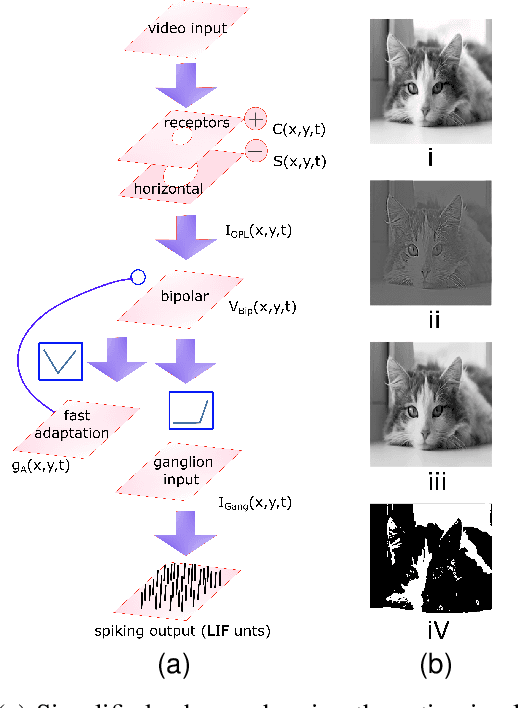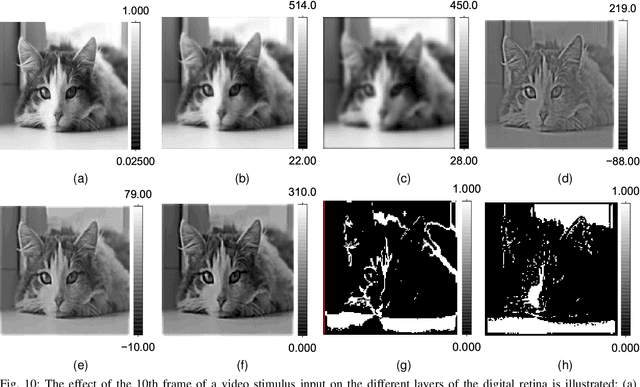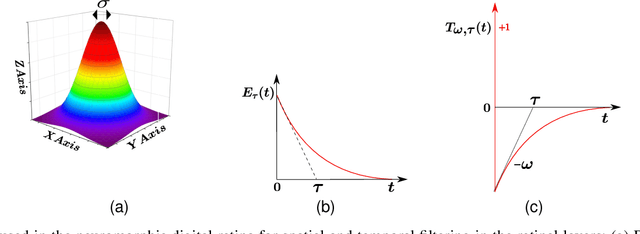Pallab Kumar Nath
Neuromorphic Retina: An FPGA-based Emulator
Jan 15, 2025



Abstract:Implementing accurate models of the retina is a challenging task, particularly in the context of creating visual prosthetics and devices. Notwithstanding the presence of diverse artificial renditions of the retina, the imperative task persists to pursue a more realistic model. In this work, we are emulating a neuromorphic retina model on an FPGA. The key feature of this model is its powerful adaptation to luminance and contrast, which allows it to accurately emulate the sensitivity of the biological retina to changes in light levels. Phasic and tonic cells are realizable in the retina in the simplest way possible. Our FPGA implementation of the proposed biologically inspired digital retina, incorporating a receptive field with a center-surround structure, is reconfigurable and can support 128*128 pixel images at a frame rate of 200fps. It consumes 1720 slices, approximately 3.7k Look-Up Tables (LUTs), and Flip-Flops (FFs) on the FPGA. This implementation provides a high-performance, low-power, and small-area solution and could be a significant step forward in the development of biologically plausible retinal prostheses with enhanced information processing capabilities
Multiplierless In-filter Computing for tinyML Platforms
Apr 24, 2023



Abstract:Wildlife conservation using continuous monitoring of environmental factors and biomedical classification, which generate a vast amount of sensor data, is a challenge due to limited bandwidth in the case of remote monitoring. It becomes critical to have classification where data is generated, and only classified data is used for monitoring. We present a novel multiplierless framework for in-filter acoustic classification using Margin Propagation (MP) approximation used in low-power edge devices deployable in remote areas with limited connectivity. The entire design of this classification framework is based on template-based kernel machine, which include feature extraction and inference, and uses basic primitives like addition/subtraction, shift, and comparator operations, for hardware implementation. Unlike full precision training methods for traditional classification, we use MP-based approximation for training, including backpropagation mitigating approximation errors. The proposed framework is general enough for acoustic classification. However, we demonstrate the hardware friendliness of this framework by implementing a parallel Finite Impulse Response (FIR) filter bank in a kernel machine classifier optimized for a Field Programmable Gate Array (FPGA). The FIR filter acts as the feature extractor and non-linear kernel for the kernel machine implemented using MP approximation and a downsampling method to reduce the order of the filters. The FPGA implementation on Spartan 7 shows that the MP-approximated in-filter kernel machine is more efficient than traditional classification frameworks with just less than 1K slices.
Multiplierless MP-Kernel Machine For Energy-efficient Edge Devices
Jun 03, 2021



Abstract:We present a novel framework for designing multiplierless kernel machines that can be used on resource-constrained platforms like intelligent edge devices. The framework uses a piecewise linear (PWL) approximation based on a margin propagation (MP) technique and uses only addition/subtraction, shift, comparison, and register underflow/overflow operations. We propose a hardware-friendly MP-based inference and online training algorithm that has been optimized for a Field Programmable Gate Array (FPGA) platform. Our FPGA implementation eliminates the need for DSP units and reduces the number of LUTs. By reusing the same hardware for inference and training, we show that the platform can overcome classification errors and local minima artifacts that result from the MP approximation. Using the FPGA platform, we also show that the proposed multiplierless MP-kernel machine demonstrates superior performance in terms of power, performance, and area compared to other comparable implementations.
 Add to Chrome
Add to Chrome Add to Firefox
Add to Firefox Add to Edge
Add to Edge